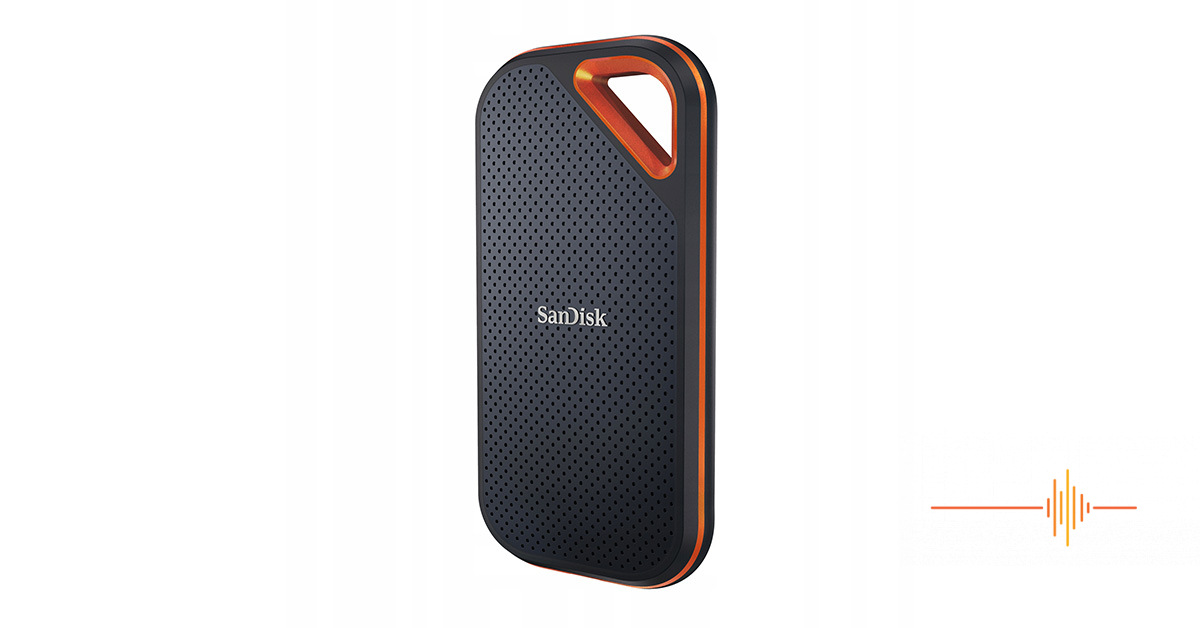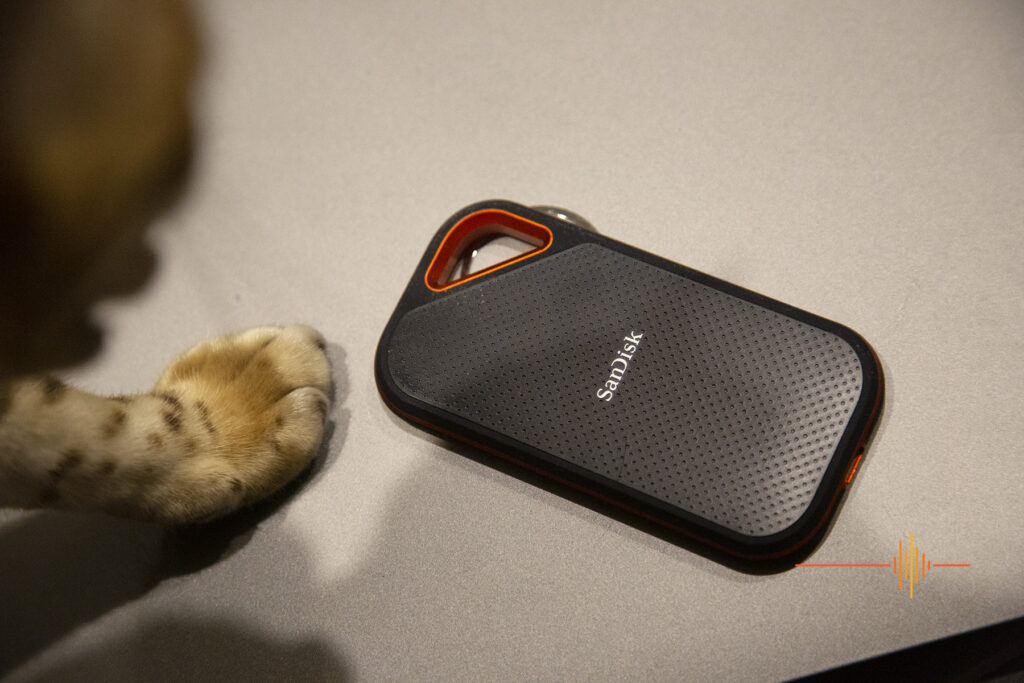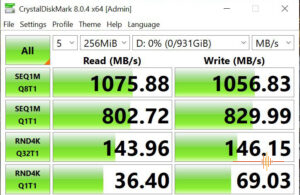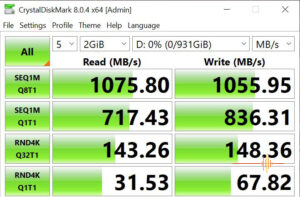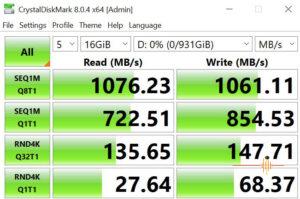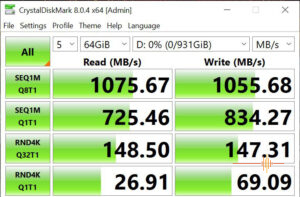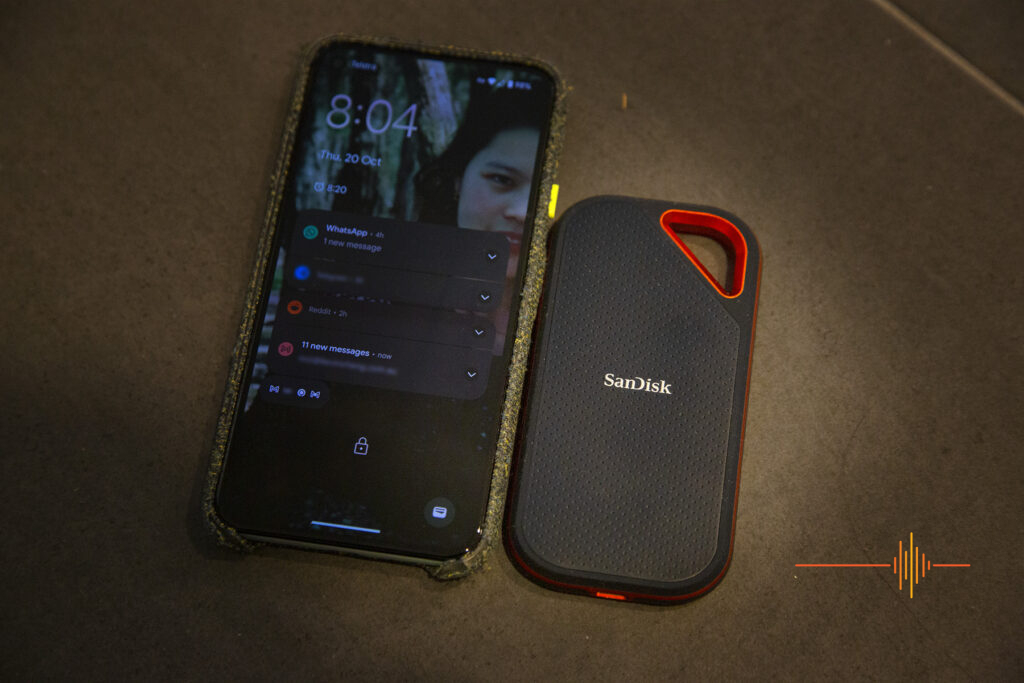Despite all the storage we have on our fingertips, there are still plenty of reasons to own a portable drive. The Sandisk Extreme Pro Portable SSD V2 is a pocket sized workhorse designed for durability and dependability.
First Impressions
Upon unboxing, the Sandisk Extreme Pro reminds me of the old Nokia 8250 – tiny, fits into my hand, easy to slip into a pocket and go.
Unlike that nostalgia phone, this is made from forged aluminium chassis with a silicon shell combo. It feels solid, although on closer inspection you can get some flex on the heatsink side if you push at it. It feels more plastic under the hand than metal, but it attracts fingerprints like the best of the metal and glass finishes. The back is a silicon shell, which feels like a silicon shell.
One corner is dominated by the carabiner loop. And I have to say, the copper orange highlights is gorgeous. It’s just like the DRN orange!
The box comes with both a USB-A to USB-C, and a USB-C to USB-C cables in 30cm length. Everything you need to hit the ground running.
In Use
Looks are great, but what matters is performance. How quickly can I get data to and from the drive?
Running Crystal Disk Mark across various file sizes, there are no surprises. A quick crash course …
- SEQ1M Q8T1 is a sequential test for 1 Mebibyte (MiB, mega binary byte, is a unit of measure representing 1024 * 1024 bytes), with 8 processes in the Queue for Thread 1. Think large files, like streaming a movie off the drive.
- SEQ1M Q1T1 is the same with 1 process Queue for Thread 1.
- RND4K Q32T1 is a random 4 Kikibyte test for 32 processes in Queue on 1 Thread.
- RND4K Q1T1 is a random 4 Kikibyte test for 1 process in Queue on 1 Thread. It basically gives an information on how much time the single files of smaller takes when you try to read , copy, or move it.
Without much ado, let’s look that the results across the board with a selection of test data sizes.
The results are actually quite consistent across all the different test data sizes. At it’s best, the Sandisk Extreme Pro hovers around 1075 MB/s on my testbed. It is about half of the rated speed on the box, so take into account a bit of marketing buffering. The rest of the difference is likely to be the mildly crippled USB-C port that I have on the notebook.
But at that speed, I can handle running a virtual machine off the USB for non-mission critical tasks and not have to stress too much on performance.
Under load, the Sandisk Extreme Pro will generate some heat, but the forged aluminium chassis acts as a heatsink so that is not a surprise.
Other Features
For those thinking of taking one on the road, hike or travel for example, the Sandisk Extreme Pro is rated for IP55 water and dust resistance and up to a 2-meter drop protection.
For clarity, you can’t take it on your next scuba dive. It is protected from water projected by a nozzle against the enclosure from any direction.
Secondly, it has complete protection against contact with live or moving parts inside the enclosure. Protection against harmful deposits of dust. The ingress of dust is not
totally prevented, but cannot enter in an amount sufficient to interfere with satisfactory operation of the machine.
The data on the drive can be protected with 256 bit AES hardware encryption, with support on Windows 8, 10 and macOS Big Sur. It does break compatibility with smart phones though. To utilise the encryption feature, you need to install the software for your OS which is provided on the drive itself.
Conclusions
The Sandisk Extreme Pro Portable SSD V2 is small and immensely portable. As a former amateur photographer and avid traveller, this would have been so handy to have back when I was really active with it all. Take one or a few, shove it in my bag, and have the ability to backup my data on the go.
The Sandisk Extreme Pro Portable SSD V2 comes in 1TB, 2TB and 4TB variants with prices starting at about $299.
DRN would like to thank Sandisk for providing the review unit.
Specifications
Capacity: 1 / 2 / 4TB
Interface: USB 3.2 Gen 2 x2
Connector: USB-C
Compatibility: USB 3.2 Gen 2×2 (20Gb/s), USB 3.0, USB 2.0
Dimensions (L x W x H): 110.26 x 57.34 x 10.22mm
Sequential Read Performance: 2000MB/s
Sequential Write Performance: 2000MB/s


